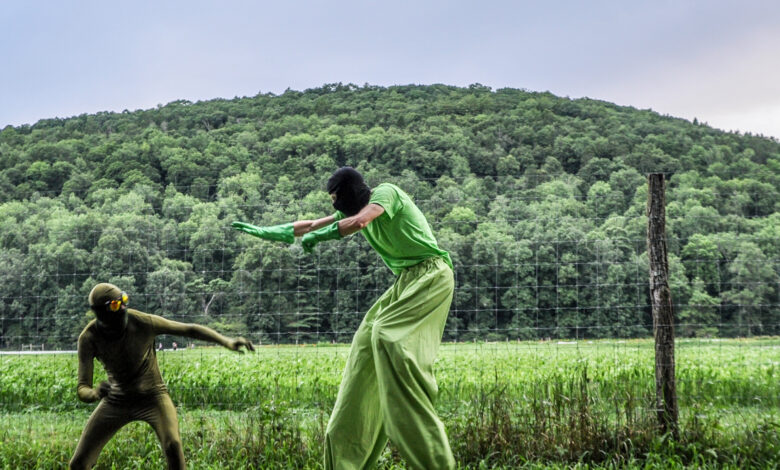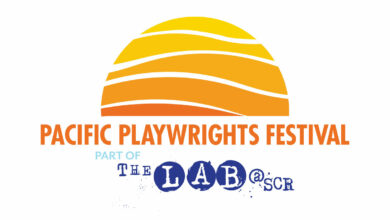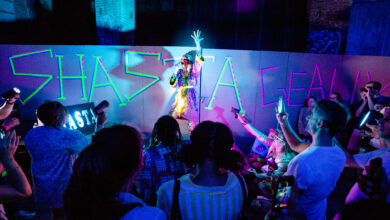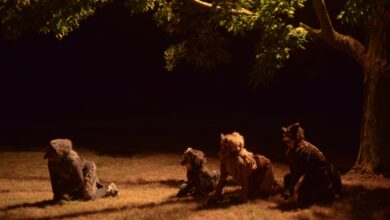Agri-Culture in Climate Change | HowlRound Theatre Commons

Around this time, we were moving our farm to a larger thirty-acre plot (our current location) with beautiful river bottom soil that borders the Delaware River. On the new land, Greg and I put in more greenhouses to increase shoulder season production, and we installed a massive solar array on our barn roof supported by “slow money” investments from a solar co-op in our area. We held public events and farm tours around the solar project, attracting community groups, businesses, schools, even politicians to the farm.
With a theatre producer’s eye, I observed how accessible and attractive the farm was to a broad population. This was not the usual theatre crowd. The range of people coming to our farm spanned age, politics, and economics. It was a magnet! Their curiosity about the crops, the soil, and organic methods coupled with their happiness to walk the land got me thinking about what an artistic practice on our farm might look like.
If we brought theatre to the farm, would we attract a wider audience? What would telling stories about climate change and our relationship to the earth mean if experienced at a local food source? And could it be a potent vehicle for calls-to-action for both the doers and the viewers? I wanted to see.
Farm Arts Collective
In 2018, I moved my artistic practice from NACL Theatre in upstate New York to a greenhouse theatre on Willow Wisp Organic Farm. I founded Farm Arts Collective with a mission to create an agri-cultural hub where art and performance intersect with agrarian and ecological ideas. Through four pillars of life-sustaining practice: Farming, Art, Food, and Ecology, I set out to design programs that connect people to food, nature, creativity, and thoughtful living.
One of my first goals as artistic director of Farm Arts Collective was to train and create a local professional theatre ensemble. I offered free weekly trainings in collaborative performance skills and attracted an eclectic mix of local performers, musicians, writers, and community members—farmers, carpenters, activists, and architects, who had never acted but wanted to learn.
A year into founding Farm Arts Collective, COP 25, the United Nations’ annual climate conference, was held in Madrid, Spain, and scientists unanimously warned the global community that we had ten years to take significant action to reduce greenhouse emissions and transition to renewables if we wanted to limit global warming to 1.5 degrees Celsius. I was both inspired and freaked out by this timeline. As a mother of an eleven-year-old, farmer-artist, and community organizer, I knew I had to do something—but what?
In 10 Brecht Poems, an anti-war performance that I made during the United States occupation in Iraq, my co-actor Leese Walker and I pose a question: “What do you do when you don’t know what to do?” We answer: “ACT!”
Right—theatre. In response to the climate scientists’ ten-year timeline, I proposed to the collective that we create one new play every year from 2020-2030 and call the project Dream on the Farm. I proposed initiating the project with this question in the face of climate change: How do we imagine our future? What are our dreams?
Dream on the Farm
The collective agreed to my proposal to build a decade-long series of climate change plays. I would direct using devised theatre methods and we would create each play collaboratively.
We started to build our first play in winter 2020, but when COVID hit, we moved rehearsals to zoom. Throughout the pandemic, our farm operated as an essential business—our farm team continued to work, we delivered food to pantries, and customers came directly to the farm to pick up pre-made vegetable bags. At Farm Arts Collective, we eventually moved rehearsals outside and in person, masked.




